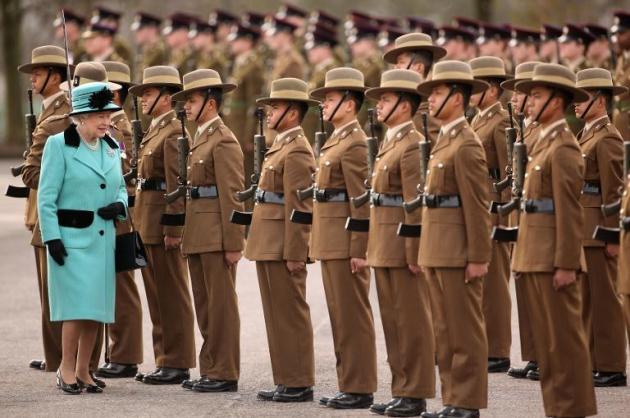
Separated by thousands of miles from their devastated homeland, Britain's community of Gurkha soldiers past and present is rallying to help victims of the earthquake in Nepal.
The 2,500-strong Gurkha brigade, soldiers recruited in Nepal, has been part of the British army for 200 years including on the frontlines in Afghanistan and Iraq.
They are famed for their ferocity and tenacity, and they use as their symbol the curved, machete-like kukri knives which they carry in battle.
As well as serving soldiers, there are still communities of retired Gurkhas dotted around Britain who often settle near military bases after leaving the army.
"We're trying to raise money but how we're going to do this, I don't know. It's not just one village -- it's villages all over the country," Om Prakash Gurung, chairman of the British Gurkha Veterans Association, told AFP.
"Nepal is a very poor country and our families depend on us -- we're the breadwinners," he said.
Gurung served as a Gurkha for 22 years, following in the footsteps of his father and grandfather, and now runs a Nepalese restaurant in Nuneaton, central England.
"I feel very sad. When I watch television, I think 'what can I do?'" he said, adding that he and other members of the town's Nepalese community were trying to keep in touch with their families every few hours.
More than 5,000 people have died and the United Nations says a total of eight million have been affected by a 7.8-magnitude earthquake which struck mountainous Nepal on Saturday.
- Family on the street -
Dozens of serving Gurkhas flew out from Britain late Monday to help the aid effort, along with 1,100 shelter kits and 1,700 solar lanterns, and more troops could be mobilised to help in the coming days.
A march marking 200 years of Gurkha service to Britain on Thursday is expected to include a commemoration of the earthquake victims.
Meanwhile, former Gurkhas around the country -- who for years have supported relatives at home by sending money back -- are trying their hardest to help their country in its hour of need.
Dhan Gurung was a Gurkha for 18 years and still lives near Shorncliffe Camp in Kent, southeast England, regimental headquarters of the Royal Gurkha Rifles.
He organised a vigil on Monday night attended by 1,000 people carrying candles and waving Nepalese flags and is trying to raise cash for tents, sleeping bags, torches and cooking pots.
"In Kathmandu, my family are outside on the street and I don't know how they cope. The majority of the community members' families are homeless and two members lost their family as well," he said.
Gurung, the first former Gurkha to be elected as a local politician in Britain, added that there was "great sadness" in the community.
But he added: "The Gurkha nature will always try to be calm and deal with this whole thing."
The Gurkhas, whose name comes from a hill village in western Nepal, first served with the British army in 1815 after impressing military chiefs during a war between troops based in British-run India and Nepal.
In recent years, Gurkha veterans fought a long battle, backed by British actress Joanna Lumley, to secure the right to live in Britain after leaving the army, resolved in their favour in 2009. They remain Nepalese citizens during their military service.
Acknowledging the role played by Gurkhas, Britain's Deputy Prime Minister Nick Clegg said Tuesday it was time to support them "in their hour of anxiety and need".
A major charity appeal to help the earthquake's victims, hosted by Lumley, will be shown on all of Britain's main television channels later on Tuesday. AFP


































